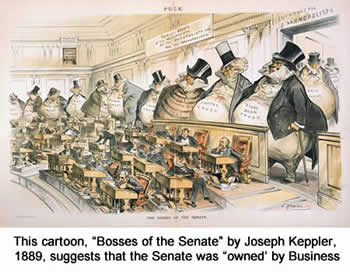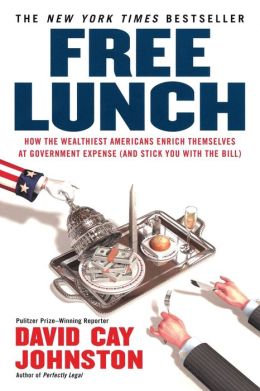
From the New York Times, "Other People’s Money," by Jonathan Chait, on 6 February 2008 -- Eight years ago, American liberalism split sharply in two over the Clinton economic record. The larger, more moderate faction deemed the departing administration to have done an exemplary job — or at least a credible effort with a weak political hand — shepherding economic growth and social justice. But a smaller, more populist faction recoiled at policies that sat comfortably with corporate America and allowed the very rich to pull farther away from the middle class. Ultimately, that populist critique became the basis of Ralph Nader’s 2000 presidential campaign, which polled in the mid- to high single digits before settling at a lower, but still decisive, 2.74 percent of the vote.
Seven years of George W. Bush has brought liberals together. The next Democratic program is already agreed upon. (Rescind the portion of the Bush tax cuts that benefit only the very rich, reform health care and take action to stem global warming.) The main arguments center on political style rather than first principles.
And yet “Free Lunch,” by David Cay Johnston, a reporter for The New York Times and the author of “Perfectly Legal,” reminds us that while left-wing populism has mostly receded into the background during the Bush years, it has not disappeared. Indeed, the movement is likely to return spitting mad if Democrats regain the White House.
“Free Lunch” consists of 26 chapters, each a case study of a corporation enriching itself through lax or solicitous government: beggar-thy-neighbor state and local tax breaks to lure businesses, government subsidies for sports stadium construction, electricity deregulation and so on. The material comes from Johnston’s journalism over the last three decades, supplemented by the contributions of several reporters he hired to help research the book (and the presence of all these hands may explain its choppy feel). The stories, generally convincing, are rendered in an unremitting tone of blunt, you’re-getting-shafted outrage.

The weakness of the book is its sudden leaps from tight-focus reporting to broad generalizations. The government, in Johnston’s telling, is a tool of the rich: “The net effect of our policies, the evidence for which is overwhelming, is that we are redistributing income up.” In fact, the government’s taxation disproportionately falls on the rich, and its spending disproportionately benefits the nonrich. Johnston documents many of the exceptions — ways in which the rich gain special benefits or shirk their burdens — and considers them the rule.
Both the style and the worldview of “Free Lunch” are unmistakably Naderite. The heroes are intrepid small-business owners, investigative reporters, plaintiffs and their lawyers, and, of course, Nader himself and his grass-roots organizations. While litigiousness has fallen out of fashion in most precincts of the left, Johnston embraces it as an instrument for social change, quite possibly overestimating the popular appeal of legal fantasies. (“Is there an American, feeling the sting of injustice,” he writes, “who has not vowed to fight all the way to the Supreme Court?” Well, I haven’t, and I suspect I’m not alone.)

Johnston portrays deregulation as evil almost as a matter of principle. (He even assails trucking deregulation, initiated under Jimmy Carter, which liberals up to and including such New Deal social democrats as Robert Kuttner have judged a success.) He regards corporations not as necessary entities that sometimes work at cross-purposes to the public interest but as inherently malevolent ones. The true visionaries, he suggests, believe that “business is at all times engaged in a conspiracy against the public that ought not to be aided by government policies.”
Of course, such views do not exactly predominate within the Democratic Party. “The real split on Capitol Hill is not between the D’s and the R’s,” Johnston writes, but between “corporatists” (the vast majority) and “peoplists.” His two examples of peoplists are the socialist Bernie Sanders and the libertarian Ron Paul — and if you’re surprised that the author would find common ground with a libertarian like Paul, keep in mind Johnston’s view of government as a tool of the rich.
The Bush years have offered a reminder that the difference between Republicans and the “corporatist” Democrats who previously inhabited the White House is fairly stark. But it’s entirely possible that beginning in 2009 the political agenda will again be set by Democrats, and they won’t be attacking American business writ large as engaged in a conspiracy against the public. Democrats might have more success holding together their coalition than they did from 1993 through 2000. “Free Lunch” demonstrates, however, that the left-wing populists haven’t gone away and won’t be satisfied with half-measures. (source: The New York Times; Jonathan Chait is a senior editor at The New Republic)




Someone necessarily assist to make critically posts I would state.
ReplyDeleteThis is the first time I frequented your web page and so far?
I surprised with the analysis you made to make this actual
publish amazing. Great activity!
Have a look at my web-site: http://petghar.com/pg/?L=blogs.blog&article=44666
Also see my site: Trisha
I think what you published was very logical. But, think about this, suppose you added a little information?
ReplyDeleteI am not suggesting your information is not good,
but suppose you added something to maybe grab folk's attention? I mean "Jonathan Chait's Other People's Money" is kinda boring. You ought to look at Yahoo's home page
and note how they write post titles to grab viewers to click.
You might add a related video or a related picture or two to get
people interested about what you've got to say. In my opinion, it might make your posts a little bit more interesting.
Also visit my homepage http://provillusofficial.blog.com/2012/09/14/provillus/
My web site - http://provillusofficial.blog.com
Good post. I learn something totally new and challenging on websites I stumbleupon on a
ReplyDeletedaily basis. It will always be helpful to read through articles from other writers and practice something from
other web sites.
Here is my web-site; http://ibwww.org/instituto/user/profile.php?id=6422